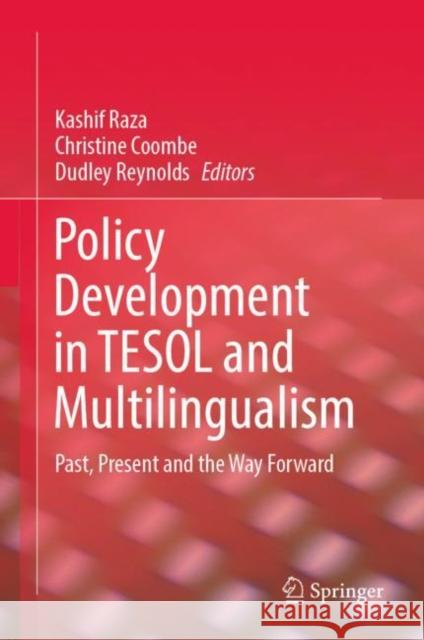Policy Development in Tesol and Multilingualism: Past, Present and the Way Forward » książka



Policy Development in Tesol and Multilingualism: Past, Present and the Way Forward
ISBN-13: 9789811636028 / Angielski / Twarda / 2021 / 434 str.
Policy Development in Tesol and Multilingualism: Past, Present and the Way Forward
ISBN-13: 9789811636028 / Angielski / Twarda / 2021 / 434 str.
(netto: 536,72 VAT: 5%)
Najniższa cena z 30 dni: 539,74
ok. 16-18 dni roboczych.
Darmowa dostawa!
Past, Present and Ways Forward: Towards Inclusive Policies for TESOL and Multilingualism
Kashif Raza, Christine Coombe, Dudley Reynolds
Part I The PastPolicy and Pedagogical Reform in Higher Education: Embracing Multilingualism
Bilingual Education in Brazil
Luciana de Oliveira and Camila Höfling
Global ESOL Assessment Practices: The Washback Effect and Automated Testing in China
Chen Li and Shahid Abrar-ul-Hassan
The Discursive Constructions of TEFL: Key Themes in the National Policies and Curriculum Documents of Two Indonesian Universities and Their Possible Ecological Reconstructions
Ribut Wahyudi
English Language Teaching Development in the Midst of Morocco’s Continuing Language Policy Conundrum
Awatif Boudihaj and Meriem Sahli
The Mythic and the Authentic Value of English in the African Classroom: A Policy Perspective
Barbara Trudell
Multilingualism Through English Dominated Bilingual Policy: Integration of International Students in Modern Singapore
Part II The Present
Enhancing Equity for English Learners Through the Seal of Biliteracy: Policy/Practice Pitfalls and Possibilities
Peter De Costa, Kasun Gajasinghe, Curtis Green-Eneix, and Robert Randez
The Ideologies of English as Foreign Language (EFL) Educational Policies in Korea: The Case of Teacher Recruitment and Pre-Service Teacher Education
Youngeun Jee and Guofang Li
Enacting a Multilingual Policy for Economic Growth: Exploiting the China-Pakistan Economic Corridor Project to Create Linguistic Harmony in Pakistan
Kashif Raza
Marginalized Students and Linguistic Challenges at Intensive English Programs in Lebanon
Tamara Khalili
Humoristic Translanguaging in Intercultural Communication in Qatar: Merits, Limitations and its Potential Contribution to Policy Development
Irene Theodoropoulou
TESOL’s Way Forward to Policy Development and Multilingualism in EMI
Shelley K. Taylor
Working Sideways for Change: Extending the Notion of Ideological and Implementational Space
Fiona Willans
Translanguaging as a Key to Socially Just English Teaching in Finland
Kristiina Skinnari, Päivi Iikkanen, and Johanna Ennser-Kananen
English as a Mediator for Communication and Understanding: The Case of Israel and Palestine
Building English Language Resources of Multilinguals
Dudley Reynolds
From TESOL to TOLSE: Plurilingual Repertoires at the Heart of Language Learning and Teaching
Sílvia Melo-Pfeifer
An Overview of Turkey’s Policy Development in TESOL and Multilingualism
Melike Ünal Gezer, Yasemin Kırkgöz, and L. Quentin Dixon
A Bourdieusian and Post-Colonial Perspective on Collaboration Between NESTs and NNESTs
Qinghua Chen and Angel Lin
Dominant Language Constellations: Teaching and Learning Languages in a Multilingual World
Larissa Aronin
The book is of interest to scholars of multilingualism, language teachers, researchers, and administrators who are developing policies on teaching English and promoting multilingualism. Given its scope, this edited collection provides an overview of how multilingualism is transforming the practice of Teaching English to Speakers of Other Languages (TESOL) in diverse contexts around the world. It serves as a platform for discussions related to policy enactment where TESOL and multilingualism are viewed as collaborative endeavours and approaches the topic from three different angles. The first section of the book provides critical examinations of previous initiatives and accomplishments in the area of language policy development and implementation. The second section describes current projects and initiatives intended to expand and strengthen the field of TESOL while providing space for local and indigenous languages to develop. The third and last part of the book highlights policy development areas that need special consideration in order to develop a form of TESOL that builds on and contributes to multilingualism.
1997-2026 DolnySlask.com Agencja Internetowa
KrainaKsiazek.PL - Księgarnia Internetowa









